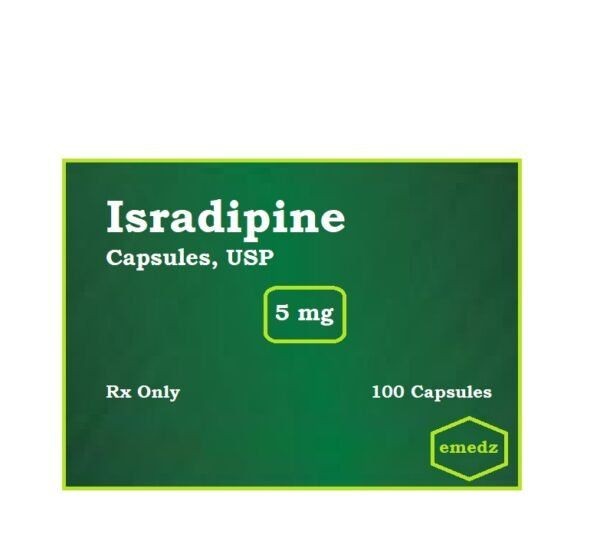
Contents
isradipine – oral, Dynacirc
Medication Uses How To Use Side Effects Precautions Drug Interactions Overdose Notes Missed Dose Storage USES: Isradipine is used with or without other medications to treat high blood pressure (hypertension). Lowering high blood pressure helps prevent strokes, heart attacks, and kidney problems. Isradipine is called a calcium channel blocker. It works by relaxing blood vessels so blood can flow more easily. HOW TO USE: Take this medication by mouth, usually twice daily with or without food or as directed by your doctor. The dosage is based on your medical condition and response to treatment. Your doctor may gradually increase your dose. Follow your doctor’s instructions carefully. Use this medication regularly to get the most benefit from it. To help you remember, take it at the same times each day. It is important to continue taking this medication even if you feel well. Most people with high blood pressure do not feel sick. It may take 2 to 4 weeks before you get the full benefit of this drug. Tell your doctor if your condition does not improve or if it worsens (for example, your blood pressure readings remain high or increase). SIDE EFFECTS: Dizziness, nausea, headache, tiredness, flushing, and swelling of the ankles/feet may occur. If any of these effects persist or worsen, tell your doctor or pharmacist promptly. To reduce dizziness and lightheadedness, get up slowly when rising from a sitting or lying position. Remember that your doctor has prescribed this medication because he or she has judged that the benefit to you is greater than the risk of side effects. Many people using this medication do not have serious side effects. Tell your doctor immediately if any of these unlikely but serious side effects occur: fainting, fast/irregular/pounding heartbeat. Tell your doctor immediately if any of these rare but very serious side effects occur: vision changes. Some people who already have severe heart disease may rarely develop worsening chest pain or a heart attack after starting this medication or increasing the dose. Get medical help right away if you experience: worsening chest pain, symptoms of a heart attack (such as chest/jaw/left arm pain, shortness of breath, unusual sweating). A very serious allergic reaction to this drug is rare. However, seek immediate medical attention if you notice any symptoms of a serious allergic reaction, including: rash, itching/swelling (especially of the face/tongue/throat), severe dizziness, trouble breathing. This is not a complete list of possible side effects. If you notice other effects not listed above, contact your doctor or pharmacist. In the US – Call your doctor for medical advice about side effects. You may report side effects to FDA at 1-800-FDA-1088. In Canada – Call your doctor for medical advice about side effects. You may report side effects to Health Canada at 1-866-234-2345.
PRECAUTIONS: Before taking isradipine, tell your doctor or pharmacist if you are allergic to it; or if you have any other allergies. This product may contain inactive ingredients, which can cause allergic reactions or other problems. Talk to your pharmacist for more details. This medication should not be used if you have certain medical conditions. Before using this medicine, consult your doctor or pharmacist if you have: certain structural heart problem (aortic stenosis). Before using this medication, tell your doctor or pharmacist your medical history, especially of: liver disease, kidney disease. This drug may make you dizzy. Do not drive, use machinery, or do any activity that requires alertness until you are sure you can perform such activities safely. Limit alcoholic beverages. Before having surgery, tell your doctor or dentist that you are taking this medication. During pregnancy, this medication should be used only when clearly needed. Discuss the risks and benefits with your doctor. It is not known if this medication passes into breast milk. Consult your doctor before breast-feeding. DRUG INTERACTIONS: Your doctor or pharmacist may already be aware of any possible drug interactions and may be monitoring you for them. Do not start, stop, or change the dosage of any medicine before checking with your doctor or pharmacist first. Before using this medication, tell your doctor or pharmacist of all prescription and nonprescription/herbal products you may use. Other medications can affect the removal of isradipine from your body, which may affect how isradipine works. Examples include cimetidine, azole antifungals (such as itraconazole), macrolide antibiotics (such as erythromycin), rifamycins (such as rifabutin), St. John’s wort, drugs used to treat seizures (such as carbamazepine, phenytoin), among others. Cimetidine is a nonprescription drug that is commonly used to treat extra stomach acid. Because cimetidine may interact with isradipine, ask your pharmacist about other products to treat stomach acid. Check the labels on all your medicines (such as cough-and-cold products, diet aids, nonsteroidal anti-inflammatory drugs-NSAIDs for pain/fever reduction) because they may contain ingredients that could increase your blood pressure (such as pseudoephedrine, phenylephrine, ibuprofen, naproxen). Ask your pharmacist about using these products safely. This document does not contain all possible interactions. Therefore, before using this product, tell your doctor or pharmacist of all the products you use. Keep a list of all your medications with you, and share the list with your doctor and pharmacist. OVERDOSE: If overdose is suspected, contact a poison control center or emergency room immediately. US residents can call their local poison control center at 1-800-222-1222. Canada residents can call a provincial poison control center.
QUESTION
NOTES: Do not share this medication with others. Talk with your doctor about making changes to your lifestyle that may help this medication work better (such as stress reduction programs, exercise, and dietary changes). Laboratory and/or medical tests (such as liver function tests, blood pressure, electrocardiograms) may be performed from time to time to monitor your progress or check for side effects. Consult your doctor for more details. There are different types of this medication available. They may not have the same effects. Do not change types without consulting your doctor or pharmacist. Have your blood pressure checked regularly while taking this medication. Discuss with your doctor how to monitor your own blood pressure. MISSED DOSE: If you miss a dose, take it as soon as you remember. If it is near the time of the next dose, skip the missed dose and resume your usual dosing schedule. Do not double the dose to catch up. STORAGE: Store at room temperature between 68-77 degrees F (20-25 degrees C) away from light and moisture. Do not store in the bathroom. Keep all medicines away from children and pets. Do not flush medications down the toilet or pour them into a drain unless instructed to do so. Properly discard this product when it is expired or no longer needed. Consult your pharmacist or local waste disposal company for more details about how to safely discard your product. MEDICAL ALERT: Your condition can cause complications in a medical emergency. For information about enrolling in MedicAlert, call 1-888-633-4298 (US) or 1-800-668-1507 (Canada). Information last revised March 2013. Copyright(c) 2013 First Databank, Inc.
Related Disease Conditions
High Blood Pressure (Hypertension)
High blood pressure (hypertension) is a disease in which pressure within the arteries of the body is elevated. About 75 million people in the US have hypertension (1 in 3 adults), and only half of them are able to manage it. Many people do not know that they have high blood pressure because it often has no warning signs or symptoms. Systolic and diastolic are the two readings in which blood pressure is measured. The American College of Cardiology released new guidelines for high blood pressure in 2017. The guidelines now state that blood normal blood pressure is 120/80 mmHg. If either one of those numbers is higher, you have high blood pressure. The American Academy of Cardiology defines high blood pressure slightly differently. The AAC considers 130/80 mm Hg. or greater (either number) stage 1 hypertension. Stage 2 hypertension is considered 140/90 mm Hg. or greater. If you have high blood pressure you are at risk of developing life threatening diseases like stroke and heart attack. REFERENCE: CDC. High Blood Pressure. Updated: Nov 13, 2017.
Angina
Angina is chest pain due to inadequate blood supply to the heart. Angina symptoms may include chest tightness, burning, squeezing, and aching. Coronary artery disease is the main cause of angina but there are other causes. Angina is diagnosed by taking the patient’s medical history and performing tests such as an electrocardiogram (EKG), blood test, stress test, echocardiogram, cardiac CT scan, and heart catheterization. Treatment of angina usually includes lifestyle modification, medication, and sometimes, surgery. The risk of angina can be reduced by following a heart healthy lifestyle.


